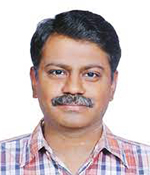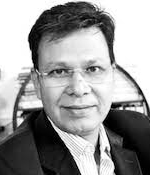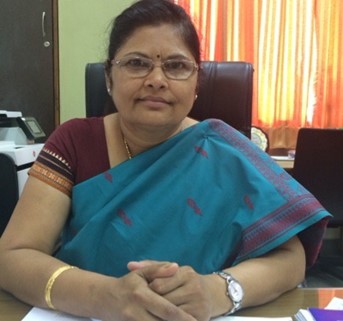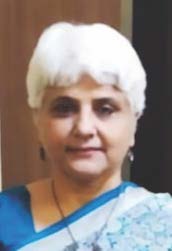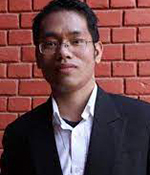Faculty
The Faculty includes distinguished persons who have won awards/honor from Professional bodies and have published through reputed publishers and refereed Journals. Our faculty members have held visiting teaching positions in Universities across the world. The Faculty Members have participated in a large number of National and International Seminars/Symposia and have acted as resource personnel in Refresher Courses at different universities. It is worth noting that some of the major works that have helped define particular fields during the various time periods of Indian History continue to come out from the teachers of this Department. Members of the Department have presided over professional forums as General and Sectional Presidents. They have also delivered endowment lectures. Some of them have taken up the organizational responsibilities of International and All India Forums as well as State level organizations of the professional historians.
PROFESSORS
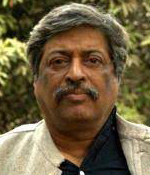
Prof. Prabhu Prasad Mohapatra
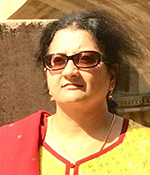
Prof. Seema Bawa
Professor Seema Bawa is a Professor specializing in History of South Asian Art and Culture at Department of History, University of Delhi. Books written by her include Gods, Men and Women: Gender and Sexuality in EarlyIndian Art and Religion and Art of the Chamba Valley, A.D. 700-1300. The areas of research focus on Indian Art Ancient Indian Art and Iconography; Western Himalayan Art and Religion and Modern and Contemporary Indian Art. She was the recipient of DAAD Fellowship to read at the University of Bonn.
She has recently researched narrative depictions of Ramayana and visual hagiographies of Ganchi. She is currently working on Gupta and Post Gupta Shivaism in Northern India, exploring the experience and manifestations through image-text study and the differential evolution of the Shaiva tirtha and pilgrimage networks.
She has lectured extensively in India and abroad on Indian art, architecture and iconography including the Institute of Archaeology, the National Museum, India Habitat Centre. Her research papers on early Indian sculptures and architecture have been published in many journals. She writes on contemporary Indian art and culture for national newspapers, specialized journals and magazines, has edited ARTimes and curated shows including the Decorated Cow: Sidharth and Shatadru: Feminine Sensibilities in Indian art for Lalit Kala Akademi.
The scope of her intellectual interests range from academic to popular culture and mass media as also ancient Indian to contemporary Art practices. She has written extensively on contemporary cultural policy, art history and criticism. Her application of academic knowledge in curation of art exhibitions, workshops, art writing for popular and specialized publications, theatre design and compiling contemporary Art History.
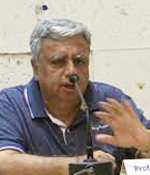
Prof. Farhat Hasan
Prof. Jaya S. Tyagi
I hold a Ph. D., and have been teaching History in the University of Delhi for the past thirty-three years. I am presently Professor in the Department of History and also hold the additional position of Director, WSDC (Women’s Studies and Development Centre for Advanced Study) in the University. I have been a Fellow at the Indian Institute of Advance Studies, Shimla (2010-2012) and also done a course in Historical Linguistics from Harvard University, Cambridge, Massachussets.
My areas of specialization include ancient Indian History, social history, gender studies, studies on households, religion, rites as well as rituals and their social context. I have published the following monographs-‘Contestation and Compliance’: Retrieving Women’s agency from Puranic Traditions, 2014, (monograph published by Oxford University Press) and ‘Engendering the Early Indian Household, Brahmanical Precepts in the Gṛhyasūtras’, 2008, (published by Orient Longman Publishers). I have also coedited a volume on Indian History and Culture, 2013 (In English and Hindi, published by Ratna Sagar and University of Delhi). I have written several articles in peer reviewed journals and chapters in edited volumes.
As Director of WSDC since 2015, I have spearheaded the Center into being given the status of a UGC recognized Center for Advanced Studies. The Center has an interdisciplinary orientation and undertakes activities related to research on gender and intersectionality. It is also involved in capacity building and training of research scholars and teachers while also being actively engaged in community outreach and gender sensitization. I have also been the Chairperson of the Internal Complaints Committee of the University.
Prof. Shalin Jain
I am a historian of Medieval Indian History and early modern South Asia, presently working as Professor of History at my alma mater University of Delhi. My research and teaching interest includes social history of Jain community, religious thought and practices, gender and society, identity formation, environment and society, popular culture and resistance. My recent monograph Identity, Community and State: The Jains under the Mughals, has been published from Primus Books. I have also has published several research papers in journals such as Indian Historical Review, Studies in History, Social Scientist etc.
Apart from being a two time winner of Professor J.S. Grewal award for best research paper in Medieval Indian History by the Indian History Congress in 2004 & 2013, I have also been recipient of UGC Raman Fellowship award for Post Doctoral Research in United States of America (2013-14) and honorary fellowship at the Center for South Asia at the University Of Wisconsin- Madison USA (2013). Have the honour of Travel Grants from the International Institute of Social History (IISH) Amsterdam, Netherlands and the German Research Foundation (Deutsche Forschungsgesellschaft) Bonn. Till recently served as fellow of CST library scholars programme of Claremont School of Theology, California, USA.
Prof. Vipul Singh
Vipul Singh teaches environmental history at Department of History, University of Delhi, Delhi, India. He is an alumnus Carson Fellow of the Rachel Carson Center for Environment and Society, Ludwig Maximilians Universität, Munich, Germany. His major area of focus has been ecologically harsh zones of India such as arid Western Rajasthan and floodplains of the Ganga. His other research interests include migration, inland fisheries, and popular culture as depicted in folklore, and vernacular literature. He is currently working on a long-term environmental history of Indian Ocean arena, and digital colonialism. His most recent monograph is “Speaking Rivers: Environmental History of a mid-Ganga Flood Country (1540-1885)”, Primus 2018.
Prof. Vijaya Laxmi Singh
Professor Vijaya Laxmi Singh teaches History in Department of History, University of Delhi. She graduated in History Honours from Patna Women’s College(Avila Convent), Patna and obtained her M.A. and M. Phil Degrees from University of Delhi and Ph. D from Jawahar Lal University, Delhi. Her six monographs are Ujjayini: A Numismatic and Epigraphic Study (1996), Mathura: The Settlement Pattern and Cultural Profile of an Early Historical City (2005), The Saga of First Urbanism in India: Harappan Civilization(2006), Portraying Cultures in Indian Subcontinent (2011) Women and Gender in Ancient India (2014), and Kashi Banaras: Sacred and Profane (2022). She has received CICOPS scholarship in 2007 and has been conferred the status of CICOPS fellow in 2012 by University of Pavia, Italy. She has published many papers in national and international journals. She has been actively participating in University affairs. Her Area of work is Ancient Indian History, Archaeology, Gender and Culture.
Prof. Santosh Kumar Rai
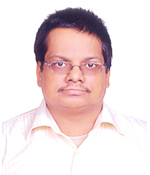
A historian of Modern Indian History, presently I am serving as the Professor at the Department of History, University of Delhi. My research and teaching engages with Social History of Uttar Pradesh; Artisanal practices, skill and Caste, Identity formation, Popular Culture, Gandhian Philosophy and Indian Nationalism. Have published several research papers in Journals like Indian Economic and Social History Review, Economic and Political Weekly, Indian Historical Review, Studies in History and several Conference Proceedings. My monograph Weaving Hierarchies: Handloom Weavers in Early Twentieth Century United Provinces has just been published by the primus Books.
I have been recipient of Professor Partha Sarathi Gupta Memorial Prize for the best research paper in the Modern Indian History in 2007 and Dr. I.G. Khan Memorial Prize for the best paper on the History of Science and Technology by the Indian History Congress in 2012 and the International Travel Grant by the International Institute of Social History (IISH) Amsterdam, Netherlands. Presently acting as the Deputy Coordinator, UGC-Centre for Advance Study (UGC-CAS-II) Programme, Department of History, University of Delhi.
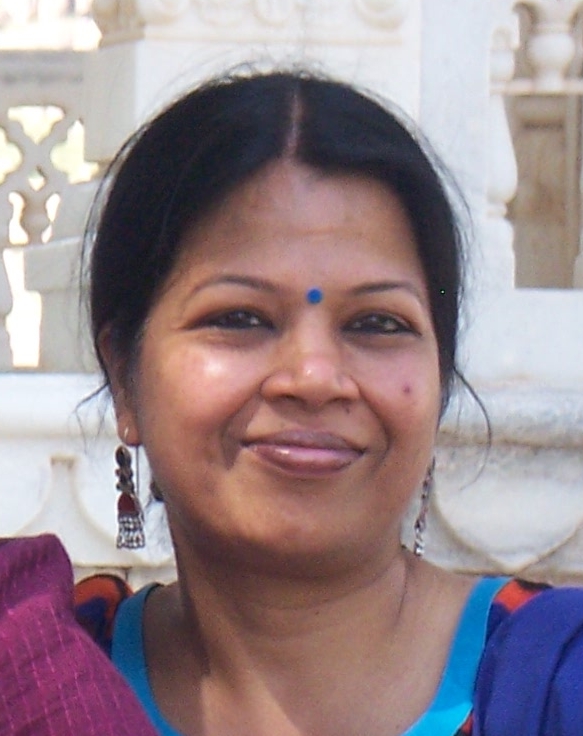
Prof. Charu Gupta
I am a Senior Professor of Modern India in the Department of History, University of Delhi. The focus of my work is gender, sexuality, masculinity, caste, religious identities and vernacular literatures in early twentieth century north India. My first book, Sexuality, Obscenity, Community: Women, Muslims and the Hindu Public in Colonial India (Permanent Black, 2001 & Palgrave, 2002; paperbacks 2005, 2008, 2012; kindle e-book 2013), addressed print and popular culture as a significant, if ambivalent site for the reproduction of patriarchy in late colonial north India. In another monograph, The Gender of Caste: Representing Dalits in Print (Permanent Black & University of Washington Press, 2016; paperback 2017), I focus on practices of distinction and hierarchy within the Hindu community through the regulation of caste, and specifically through the impact of caste ideology on women in the interwar period. A co-authored book of mine, Contested Coastlines: Fisherfolk, Nations and Borders in South Asia (Routledge, 2008, 2018), probed the troubled journeys of coastal fisherfolk arrested and jailed by India, Pakistan, Sri Lanka and Bangladesh for having entered each other’s territorial waters. I also regularly write academic articles in Hindi and am the author of the books Streetva Se Hindutva Tak: Aupaniveshik Bharat Mein Yaunikta Aur Saampradayikta (Rajkamal, 2012) and Jati aur Ling: Dalit, Savarna aur Hindi Print Sanskriti (Vani Prakashan, 2023). Some of my writings have been translated as books in Marathi and Bengali. I have edited various books, including Gendering Colonial India: Reforms, Print, Caste and Communalism (Orient Blackswan, 2012), Caste and Life Narratives (co-ed, Primus, 2019) and Literary Sentiments in the Vernacular: Gender and Genre in Modern South Asia (co-ed, Routledge, 2022). I have published more than forty research papers in peer reviewed journals, including in South Asia: Journal of South Asian Studies, The Indian Economic and Social History Review, Economic and Political Weekly, Porn Studies, Studies in History, Biography: An Interdisciplinary Quarterly, Modern Asian Studies, The Journal of Asian Studies, Journal of Women’s History, Cultural Dynamics, American Religion, Studies in People’s History, South Asian Review, South Asian History and Culture and Race and Class. I have been the guest co-editor of special issues of the journals South Asia: Journal of South Asian Studies, Biography: An Interdisciplinary Quarterly and Cultural Dynamics.
I earned my PhD from SOAS, University of London on a Commonwealth Scholarship. I have been a Distinguished Visiting Scholar-in-Residence, Rutgers University; Vising Fellow at Neubauer Collegium for Culture and Society, University of Chicago; Visiting Professor and ICCR Chair, University of Vienna; Visiting Faculty, Yale University and Washington University; and Rama Watamull Distinguished Indian Visiting Scholar, University of Hawaii. I have also been a Fellow at Nehru Memorial Museum and Library, Delhi; Social Science Research Council, New York; Asian Scholarship Foundation, Thailand; Wellcome Institute, London; and University of Oxford. I serve on the editorial board of various journals, including South Asia: Journal of South Asian Studies, Gender and History and Journal of Women’s History. I am presently working on social histories of particular genres and subjects through life narratives in Hindi in early twentieth century. The four protagonists of my current book project carved out utopian dreams of vernacular freedom through the diverse vantage points of ayurveda, caste, travel and communism.
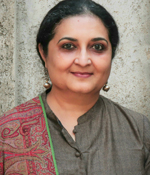
Prof. Parul Pandya Dhar
Parul Pandya Dhar is a historian of visual arts, with long years also in the field of performing arts. Her work engages with Indian art and architecture, art historiography, and connected histories of South and Southeast Asia. She has authored The Torana in Indian and Southeast Asian Architecture (2010), edited The Multivalence of an Epic: Retelling the Ramayana in South India and Southeast Asia (2021) and Indian Art History: Changing Perspectives (2011); and co-edited Temple Architecture and Imagery of South and Southeast Asia (2016), Asian Encounters: Exploring Connected Histories (2014), and Cultural Interface of India with Asia (2004), besides contributing several research papers. She has been awarded the Alexander von Humboldt Post-Doctoral Fellowship Germany (2007-08), the CAA-Getty International Travel Award, USA (2012 & 2018), and the Nehru Trust Research Award, UK (2004), and has served on the editorial committees of the EFEO-Paris and Visual Resources journal (Taylor & Francis). She is currently writing on issues relating to art and mobility, and epic encounters across the Indian Ocean, and is also collaborating on a project about visuality and collective memory.
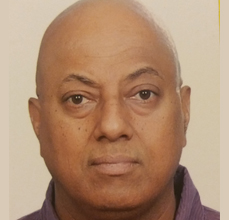
Prof. Anirudh Deshpande
I teach modern and early modern Indian and European history at the Department of History, Delhi University. I have authored The British Raj and its Indian Armed Forces, 1857 – 1939, OUP, 2002; British Military Policy in India 1900-1945: colonial constraints and declining power, Manohar Publishers, 2005; Class, power and consciousness in Indian cinema and television, Primus Books, 2009; The First Line of Defence-Glorious 50 Years of the Border Security Force, BSF, Shipra Publications, 2015; Hope and Despair: Mutiny, Rebellion and Death in India, 1946 Primus Books, 2016 and The Practice of History: Essays in Search of a New Past, Akaar Books, 2020.
I have more than seventy academic papers, commentaries, reviews and numerous articles since 1987 in journals and newspapers such as Indian Economic and Social History Review, Studies in History, Economic and Political Weekly, Journal of Imperial and Commonwealth History, Contemporary India, Book Review, Biblio, Mainstream and Hindustan Times, Telegraph, Tribune, Pioneer and Amar Ujala. I am a regular commentator on India’s only bilingual journal Forward Press dedicated to social justice. A commentary on ‘Treating the Visual as an Archive’ in the EPW, December 22, 2018 (ISSN 0012-9976) marked the 26th year of my consistent publication in that prestigious journal. I have a double peer reviewed entry The Wars of the English East India Company, 1740-1849, in the International Encyclopaedia of War, Wiley-Blackwell, edited by Gordon Martel, 2012. In 2015 I wrote the Introduction to the English translation of Govind Pansare’s famous Marathi book Shivaji Kon Hota - Who was Shivaji, published by Leftword Books. A double peer reviewed entry in the OUP Online Research Encyclopaedia of South Asian History called The Indian Army 1850-1950 has been published in August, 2019. I write Hindi short stories, four of which have been published in newspapers and journals. My novel Dreamt Lives (Solar Books, New Delhi) was published in 2018 and has received excellent reviews on Amazon. Other publications include: ‘The Indian Fort as Site of Intersections’, Book Chapter in Radhika Seshan (ed.), Narratives, Routes and Intersections in Pre-Modern Asia, Routledge, London and New York, 2017; ‘Past, Present and Oral History’ (Special Article) in the Economic and Political Weekly, 22 July, 2017; ‘Tiger by the Tail: Demobilization of the Indian Army of War, 1918-1923’, Book Chapter in Alan Jeffreys (ed.), The Indian Army in the First World War, Helion and Company, Solihull, 2018. [ISBN 978-1-911512-3]; ‘Locating Syed Ahmad Khan in Colonial India’ in Forward Press, April 2018. [ISSN No. 2348-9286]. My novel Dreamt Lives and short stories Interview and Corona CV have been serialized on the multilingual online literary journal MartruBharti. My latest paper on the quotidian life of Marathi speaking soldiers in 18th century has appeared in Hakara (September, 2020), a bilingual English-Marathi journal.
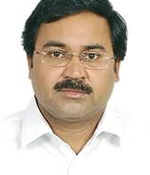
Prof. Raziuddin Aquil
Professor Raziuddin Aquil teaches medieval and early modern history. He has published widely on religious, literary and historical traditions in Sultanate and Mughal India. His books include The Muslim Question: Understanding Islam and Indian History (Penguin, 2017), and Days in the Life of a Sufi: 101 Enchanting Stories of Wisdom (Pan Macmillan, 2020). He has also co-edited with Professor Partha Chatterjee, History in the Vernacular (Permanent Black, 2008), with Professor David Curley, Literary and Religious Practices in Medieval and Early Modern India (Manohar and Routledge, 2016), and with Dr. Tilottama Mukherjee, An Earthly Paradise: Trade, Politics and Culture in Early Modern Bengal (Manohar and Routledge, 2020).

Prof. Sanghamitra Misra
I teach at the Department of History, University of Delhi, and specialize in the history of modern India. My research interests include histories of frontiers and borderlands, the political economy of colonisation, the figure of the primitive, colonial state formation and law, and the histories of tribal/peasant rebellions. I have studied at the University of Delhi, Jawaharlal Nehru University and the School of Oriental and African Studies, University of London. I have been a Commonwealth Scholar at the School of Oriental and African Studies, London, a British Academy-AHRC-ESRC Visiting Fellow at the School of Oriental and African Studies, London, and a Fellow at the Nehru Memorial Museum and Library, New Delhi. My work has been published in academic journals including the Indian Economic and Social History Review, Studies in History, the Economic and Political Weekly and the Modern Asian Studies and in anthologies. My monograph, Becoming a Borderland: The Politics of Space and Identity in Colonial Northeastern India was published in 2011 by Routledge: London and Delhi (Paperback Reprint with a new introduction: 2014, 2017). I have been the recipient of several fellowships including the Harold Hyam Wingate Trust, ICSSR, ICHR, and the Charles Wallace India Trust.
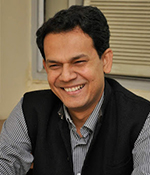
Prof. Saifuddin Ahmad
Saifuddin Ahmad is Professor in the Department of History, University of Delhi and specializes in medieval Indian history. He completed BA and MA in History from Aligarh Muslim University, Aligarh, MPhil from Jawaharlal Nehru University, New Delhi and PhD from University of Delhi, Delhi. My research interests include Medieval Indian History, History of Islamic world, Early Modern India, Literary Cultures and, Early modern North Africa and Spain. At present, I am working towards publication of a monograph primarily with Urdu and Persian sources, exploring the literary culture of Mughal North India in the eighteenth century by focussing on the connection of literature with the political context, especially with regard to shifting patterns of patronage, and thus trying to understand the literary and cultural milieu of pre-modern South Asia.
My research papers and articles have been published in academic journals and edited volumes such as Social Scientist, South Asian Journal of History and Culture, Urdu Studies, International Journal of Research, The Book Review, Biblio.
Besides I am a member of Board of Research Studies, Coordinator Ph.D & M.Phil. Programme, Department of History. As the Coordinator of the course, I liaison with the students and the conveners of the course and finalization of schedules, readings, final evaluation, and declaration of results.
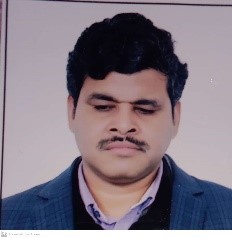
Prof. Vikas Gupta
Prof. Vikas Gupta is a Professor in the Department of History, University of Delhi. His broad area of academic research includes historical and contemporary aspects of education in modern India with a special focus on curricular knowledge, social inequalities, state policies and school practices. Besides this, he is interested in the history of language, nationalism and community relations in South Asia; and in the history of modern France. He has widely written on these themes; taught courses on these issues to Post-Graduate students; and delivered numerous lectures at different internationally and nationally renowned educational institutions. His recent book is Vikas Gupta, Rama Kant Agnihotri and Minati Panda, (Ed.), Education and inequality: Historical Trajectories and Contemporary Challenges, Hyderabad: Orient Blackswan. Earlier he jointly published a volume: KM Shrimali, Vikas Gupta, Shalini Shah and others, Teaching History, New Delhi: Aakar, 2013. He is an Advisory Editorial Board Member of Contemporary Education Dialogue published by Sage.
Dr. Amarjiya Lochan
ASSOCIATE PROFESSORS
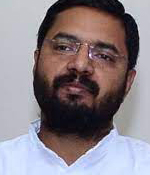
Dr. Surendra Kumar
I am an Intellectual Activist and teaching in university of Delhi since August, 2004. My areas of Research are African Diaspora, Military Labour Market, Social Movements, Dr. Ambedkar and Gandhi. I have published works on – a. Rajiv Gandhi: Pioneer of 21st Century, b. Issues of Identity and Assimilation, c. Idea of India: Mahatma Phule and Dr. Ambedkar. Apart from books, the research papers/ articles have been published in Journal of Emerging Technologies and Innovative Research, International Journal of Research in Social Sciences, SPI , Congress Sandesh, Pakhi, Sablog etc.
Having Completed Doctorate from Jawaharlal Nehru University and awarded ICSSR Fellowship, I am continuously contributing to save Higher Education as Elected Secretary of Rajdhani College Teachers Association( 2008), Elected Member of Delhi University Teachers Association( DUTA- 2011-2013 & 2013-3015, 2017-2019), General Sectary , Delhi State, Indian National teachers Congress( 2016 to till date) , Coordinator- University of Delhi, Rajiv Gandhi Study Circle( 2016-2018), Observer to Punjab and Gujarat-RGSC, 2017, Chairperson- Delhi University Academic Forum( 2017 till date) , National Convenor- Dialogue for Academic Justice( DFAJ- All India Networking Organization of Teachers’ Association, 2018 to till date), contributed for Justice by organizing Indefinite Fast for 36 days( 6+14+18) in 2018.
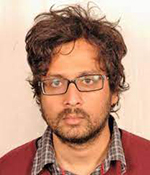
Dr. Rahul Govind
I teach at the Department of History, University of Delhi. I studied History at St. Stephen’s College, University of Delhi for the B.A. (hons) and M.A., and completed my PhD at Columbia University, New York. I have been a Fellow at the Indian Institute of Advanced Study, Shimla, and held Visiting Fellowships at the Centre for Study of Developing Studies, Delhi and the University of Cambridge, Cambridge. My interest in metaphysics, political-economy, jurisprudence, religion and imperialism has led to publications in the following journals: Indian Economic and Social History Review, Telos, Studies in History, Journal of the Indian Council of Philosophical Research, Economic and Political Weekly, Cultural Critique, National Law School Review of India and the JMC Review. Apart from editing a special issue of Studies in the Humanities and Social Sciences (IIAS Shimla) on ‘Ascertaining Certainty: Self and Cosmos’ (2013) I have published The Infinite Double: Persons/Things Empire/Economy (IIAS Shimla 2015). At Delhi University, I teach graduate courses on Revolutions, Political Thought, the Colonial Economy, Imperial Jurisprudence and Historiography and have guided research on Economic, Constitutionalist, Intellectual and Literary history.

Dr. Bhuwan Kumar Jha
Bhuwan Kumar Jha (Associate Professor) studied at Kirori Mal College for his BA (Hons) and MA in History. He did his MPhil and PhD degrees from the History Department of Delhi University. He has earlier taught history at CHS, JNU, at Satyawati College and some other colleges of Delhi University. He has also been a Fellow at the Prime Ministers’ Museum and Library, Teen Murti, besides serving as an Affiliated Fellow, and Deputy Director, at the Centre for Global Studies, Delhi University. He has also worked in the administration of the University as Assistant Registrar. He specialises in modern and contemporary Indian history. He has worked on themes related to the Indian National Movement, development of ideas and institutions around Hindu identity, e.g. Hindu Mahasabha, Arya Samaj and other fraternal organizations; formation and interlinkages of political groups in twentieth century; contextualizing the role and contributions of Pandit Madan Mohan Malaviya; history of CAPFs etc. His most recent works include a history of CRPF (a project commissioned by the organization) Nation First: 82 Years of Glorious Service to the Nation 1939-2020, Rupa, New Delhi, 2021; Hindu Nationalism in India: Ideology and Politics, Routledge, Oxon and New York, 2020 (co-authored); ‘Mahatma and Mahamana: Agreement within Differences’, Indian Historical Review, Vol.49, No.1, June 2022; ‘Negotiating the Place of Madan Mohan Malaviya in Modern Indian History’, Occasional Paper, History and Society, New Series, 107, Prime Ministers’ Museum and Library, New Delhi, 2021; ‘Nehru Report, Muslim demands and the Hindu Mahasabha: Elusive Consensus on Future Constitution’ in Indian Journal of Public Administration, Vol.64, No.4, December 2020; CISF— Force of the Future, Sheriden Book Company, Delhi, 2019 (co-authored). A list of his publications is available on
https://scholar.google.co.in/citations?hl=en&user=VMhjUVsAAAAJ
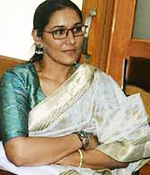
Dr. Manisha Choudhary
Manisha Choudhary teaches History at University of Delhi. She specializes in the History of Medieval India and Rajasthan. She has acquired her Degree of Bachelors from Miranda House (University of Delhi) and pursued M. Phil and Ph. D Degrees from University of Delhi. She has working knowledge of Urdu and Persian. The various aspects of Banjara community and their social and economic contributions in pre-colonial states have been explored extensively in her book titled Trade, Transport and Tanda: Shifting Identities of the Banjaras (Manohar, Delhi, 2018). Recently, she has published Delhi: A History (Rupa, Delhi, 2020) and The Eternal Dastur Craft (Primus, Delhi, 2020).
Much of her works are based on the archival documents written in Dhundhari. She has published and lectured extensively on economic, cultural, social and environmental History. She has completed her project titled “The depiction of multi-faceted lifestyles in the bhiti-chitrakari of Setho ka Ramgarh and Nawalgarh havelis: A study into popular knowledge system and role of traders” funded by Research and Development Grant awarded by University of Delhi. She is recipient of Professor Pema Ram Award for Best Paper-2019 at Rajasthan History Congress. Recently, being a Fellow at Indian Institute of Advanced Study, Rashtrapati Nivas, Shimla, she has successfully completed the project titled The History of Thar: Environment, Culture and Society, which is in press.
Dr. Aparna Balachandran
I am a historian of modern India, and my research and teaching interests include early British colonialism in South India, legal history, urban history and histories of visuality and commemorative practices. I also have an interest in the politics and practices of archiving in colonial and post-colonial India, I did my BA and MA in History from the University of Delhi, MPhil from Jawaharlal Nehru University, Delhi and PhD from Columbia University, New York.
I have co-edited a volume entitled “Iterations of Law: Legal Histories from India”
( Oxford University Press, 2018), and co-written a book, Archives and Access ( The Centre for Internet and Society, 2011). I am currently in the process of completing a monograph on early colonial law and urbanism in the city of Madras, and am co-writing a book on collective memory, materiality and history. Over the years, I have received a variety of grants to facilitate my research including from the Charles Wallace India Trust, the British Academy, the Max Planck Institute for European Legal History and the University of New South Wales. I am currently the Books editor for South Asian Studies ( the journal of the British Association of South Asian Studies).
ASSISTANT PROFESSORS

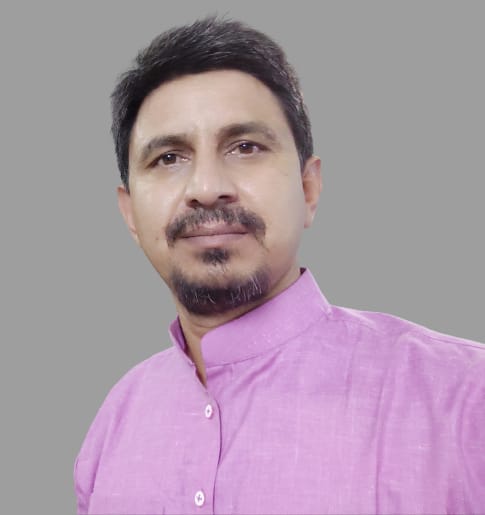
Dr. Sajjan Kumar
Sajjan Kumar, is an archaeologist cum historians of ancient Indian history. I teach at the Department of History, University of Delhi with specialize Archaeology and Ancient Indian History. My research interests include Field Archaeology, Prehistoric, Protohistoric and Historical Archaeology, Settlement Archaeology, Archaeological Theories and Methods, and Ancient Indian History. I have authored two books Domestication of Animals in Harappan Civilisation, and Rajatarangini Mein Varnit Samaj, Research India Press, New Delhi and the chief editor of Proceedings of the Haryana History Congress (published annual) since 2016. My research papers and articles have been published in reputed academic international and national journals and various edited volumes. He received two years (2007-2009) research fellowship by Indian Council for Historical Research (ICHR) New Delhi.
Besides, I am Life Member/Member of various professional societies/trusts such as Indian History Congress, Haryana History Congress, National Book Trust, India and Indian Archaeological Society.

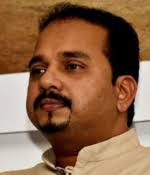
Dr. Yasser Arafath
P.K. Yasser Arafath is a historian of medieval and early modern India. His research primarily focuses on Kerala, and the areas of his interests include its intellectual traditions, Arabi- Malayalam literature, history of violence, Indian Ocean communities and the cultural history of the body and hygiene. He is also interested in the history of science, technology and gastro- politics. His research papers and essays are published in edited volumes and peer reviewed journals that include Journal of the Royal Asiatic Society, Economic & Political Weekly, Social Scientist, The Medieval History Journal, and The Indian Economic and Social History Review. He regularly writes for news-papers and popular magazines and his articles are published in The Hindu, The Indian Express, The Telegraph, Deccan Chronicle, The Asian Age, The Wire, Madhyamam, Deshabhimani and Mathrubhumi.

.jpg)
